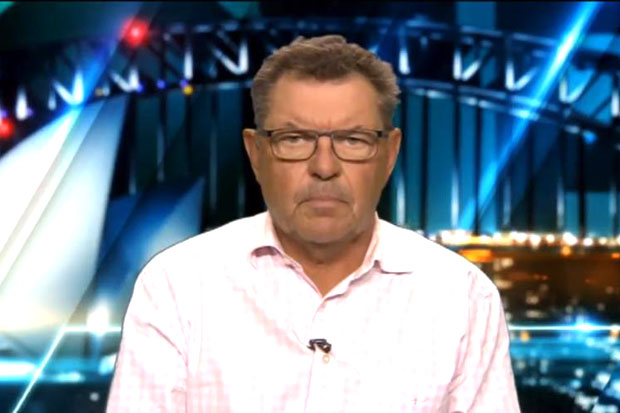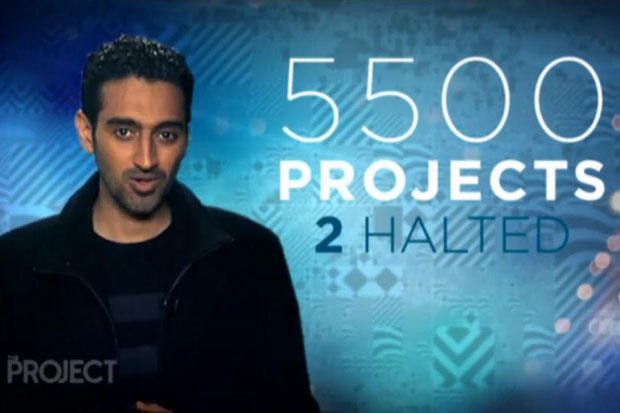Right wing shock jock Steve Price was always going to have an on-air conniption when he took up the government’s charge to reframe the national conversation away from its many weeping sores and onto green “lawfare”.
But given that Price's wife is the Chief of Staff to Environment Minister Greg Hunt, you’d think he could get his facts straight.
Things started on a bad note last night when the commentator, who works with Alan Jones at 2GB Radio, appeared on Channel Ten’s The Project to defend the government’s push to remove communities’ rights to challenge environmental approvals issued by the Environment Minister.
Host Carrie Bickmore introduced Price by disclosing his wife’s job, which got Pricey a bit fired up.
“I don’t think we need to say what my wife does for a job, it’s got nothing to do with what I say either on The Project or on radio every night around Australia, so let’s get that straight,” an agitated Price said.
Things went downhill from there, although in Price’s defence, he’s probably right. Any fair-minded observer would naturally expect Price to close ranks with the government and rail against the “cashed up” greenies picking on huge mining conglomerates like Indian billionaire Gautam Adani’s Adani Group, regardless of who he’s married to.
At the mercy of Mackay Conservation Group’s fabulous wealth and stores of kale, Adani’s mammoth Australian project — the $16.5 billion Carmichael coal mine in Queensland’s Galilee Basin — suffered a set back in the Federal Court last week when it had its Commonwealth approval rescinded.
The Department of Environment said it would take less than two months to re-issue the approval, which was revoked because the Environment Minister failed to properly administer national environmental law. But, puzzlingly, the government’s sought to capitalise on its own blunder by accusing green groups of “sabotaging” big coal and trying to wedge Labor over its support for “inner city greens”.

“To protect Australian jobs” Attorney General George Brandis has announced the government will seek to repeal section 487 of the Howard-era Environment Protection and Biodiversity Conservation Act, making it very unclear who would be able to challenge government decisions because the legal right to bring a case would be determined by common law.
“I think that what this legislation attempts to do is it gives locals like farmers and people who live in that area the first right of refusal to have a project in their region, and what they’re trying to prevent is cashed up groups like Greenpeace who would like to stop every project that involves coal completely, from being able to do that,” Price said.
To begin with Price, like the rest of us, could actually have only a sketchy idea at best of what affect reverting to common law precedent on standing would have. Unless, perhaps, he has some inside information from his wife. But the idea that “cashed up groups” are bringing down big coal through the EPBC Act is objectively absurd.
According to the Australia Institute, out of a total 5,500 projects assessed against the Act since it was introduced 16 years ago just 33, or around 0.6 per cent, have been challenged in the Federal Court.
"Of the thirty three actions, four were discontinued or resolved with the consent of the parties and six were ‘legally successful’, in the sense that the applicant received a judgment and/or orders in its favour," the Institute's Executive Director Ben Oquist said.
It’s also worth noting that in the life of the act, the sum total of two projects have been halted by the courts.
But as Steve Price so insightfully interjected during a heated exchange with Project co-host host Waleed Aly, “You’ve got a job why shouldn’t the people who are going to work on those mines have a job?”
There are quite a few good reasons why those would-be miners shouldn’t have a job. Including that the mine will create four times the carbon emissions of New Zealand, and its construction will pave the way for other mines slated to pump out as much emissions as South Africa or the United Kingdom each year.
Leaving that aside, there’s also the perennial problem of conservatives getting the job figures wrong. “Now, there’s somewhere between 1,500 and 10,000 jobs in these two mining projects which we need to have in this country,” Price said.
As Aly pointed out (although he didn’t take up the question of what the mystery second mining project is), “Steve it’s not somewhere between 1,500 and 10,000 jobs, it’s actually less than 1,500 jobs.
“Their own expert in court admitted that when they were questioned; they said 1,464 employment years in this project.”

But “hang on Waleed, hang on”. “Ten jobs is good, a hundred’s good, two hundred’s good”. That’s they key message here, folks – jobs are good.
An exasperated Aly attempted to move on, noting that “these provisions have been looked at before”.
“There was a Howard-era public servant, in fact this might have been done during the Howard Government, looking at this specific legislation,” Aly said, “and they said, ‘the provisions have created no difficulties, they should be maintained”.
“In fact they said, ‘the question is whether or not they should be expanded further’,” which is sort of related to what another relic of the Howard era, Liberal MP Philip Ruddock, said when he pointed out that there are checks and balances built into the system and frivolous or vexatious cases would be thrown out with costs against the litigant.
So “what’s the problem?” Aly asked Price, who went on to claim “We’ve got Adani saying they’re going to walk away from the project because they can’t get it off the ground”.
We'll stop you there Pricey. Adani has consistently maintained that, despite laying off contractors as it struggles to make the financial case for its mega-mine, it’s committed to the project.
It turns out most of the world’s big financiers – read ‘banks’ – are not.
So far, at least 12 major financial institutions have ruled out financing the Galilee projects, and the Commonwealth Bank and Standard Charter have recently walked away from their advisory roles.
That might have something to do with (a) climate change and the slated impact of the mine; and (b) the tanking price of coal. Probably more the latter.
And on that front, if only the Prime Minister, Environment Minister, Industry Minister or Attorney General had agreed to be interviewed on The Project, we might know more about why the Abbott government remains so committed to it.
Donate To New Matilda
New Matilda is a small, independent media outlet. We survive through reader contributions, and never losing a lawsuit. If you got something from this article, giving something back helps us to continue speaking truth to power. Every little bit counts.




